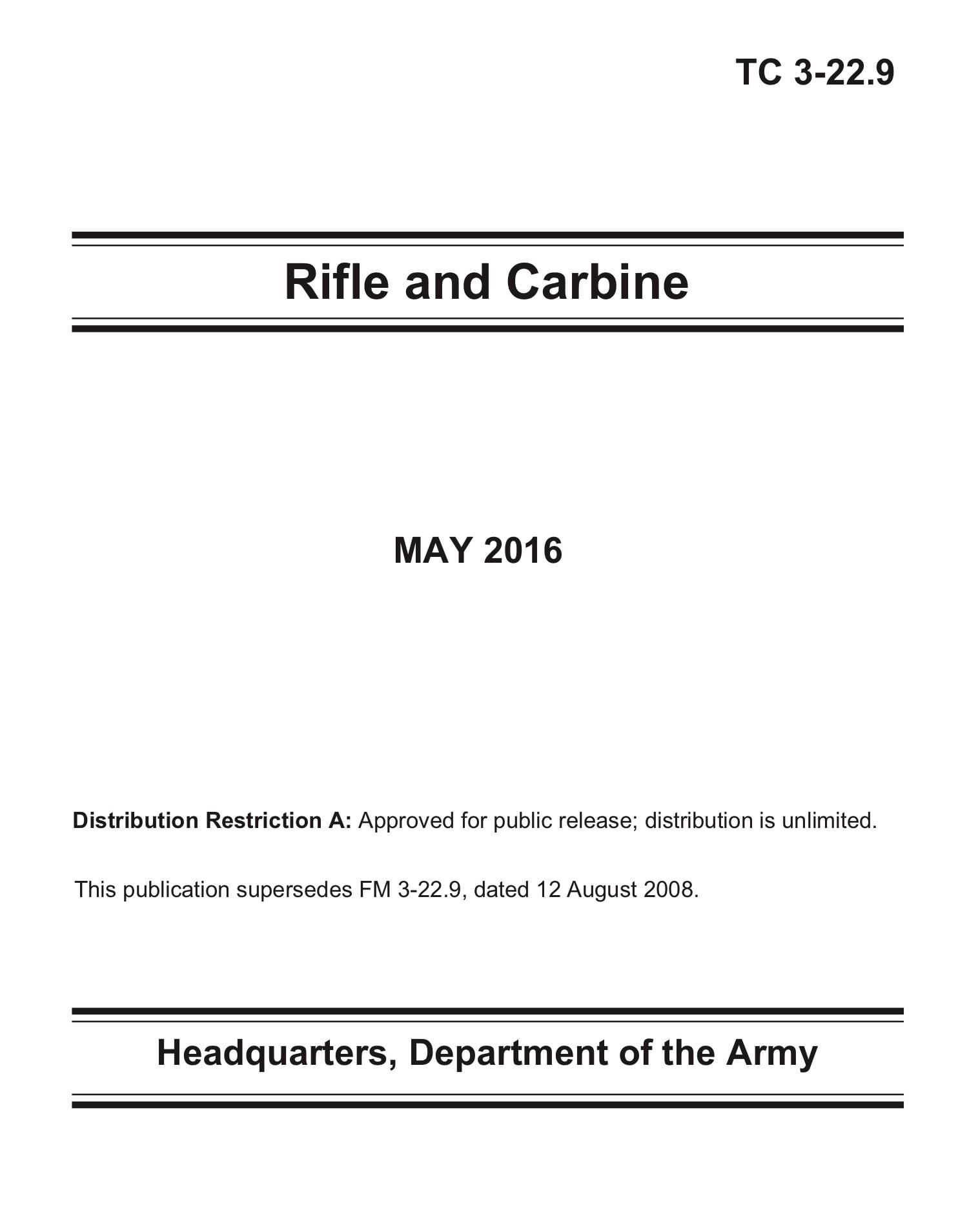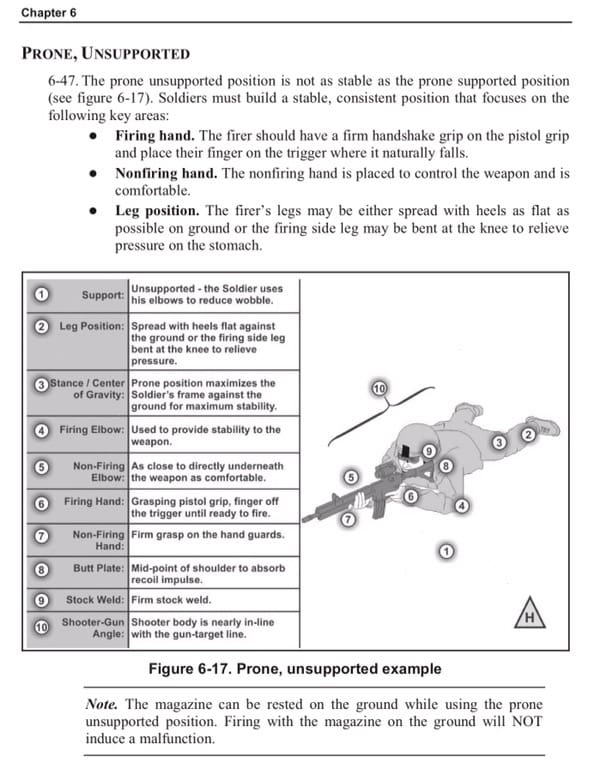This morning, the US Army published the highly anticipated revision to FM 3-22.9 last updated in 2008.
The Introduction explains the Training Circular’s organization.
This manual is comprised of nine chapters and five appendices, and is specifically tailored to the individual Soldier’s use of the M4- or M16-series weapon. This TC provides specific information about the weapon, aiming devices, attachments, followed by sequential chapters on the tactical employment of the weapon system.
The training circular itself is purposely organized in a progressive manner, each chapter or appendix building on the information from the previous section. This organization provides a logical sequence of information which directly supports the Army’s training strategy for the weapon at the individual level.
Chapters 1 through 4 describe the weapon, aiming devices, mountable weapons, and accessories associated with the rifle and carbine. General information is provided in the chapters of the manual, with more advanced information placed in appendix A, Ammunition, and appendix B, Ballistics.
Chapters 5 through 9 provide the employment, stability, aiming, control and movement information. This portion focuses on the Solider skills needed to produce well aimed shots. Advanced engagement concepts are provided in appendix C of this publication. Appendix D of this publication provides common tactical drills that are used in training and combat that directly support tactical engagements. Finally, appendix E of this publication, is provided at a common location in this and future weapons publications to provide a common location for reference.
This manual does not cover the specific rifle or carbine training strategy, ammunition requirements for the training strategy, or range operations. These areas will be covered in separate training circulars.
There’s lots of info in this TC but the Army’s biggest epiphany may be found at the bottom of this page in Chapter 6.




Great guys behind the writing of this.
Defoor among them?
Hey, they put something in a manual that works! Killer job.
Thanks for the post, SSD.
The team I worked with for 16 months on this included the 10th Mountain, 82nd, 101st, AMU, MCoE, California National Guard and many others.
Those guys made it happen.
Good stuff!
Glad to have been a part of this book! And for all the other that put in so much work into making this a reality, bravo zulu gentlemen!!!
Get some Kelly!
Great to see it’s finally on paper (in reference to botton of ch 6)
Also interesting that the rail on the rifle is extended with an FSB cut out… wonder if they used the RIS II FSP/SOPMOD Block II as their model?
Or that the drawing is of a 16″ civilian length barrel?
That is one of the AMU M4’s. It is a 14.5 inch.
Wasn’t nitpicking. Great work. It just looks like the rifle from the Daniel Defense catalog which is where many of the tech illustrators get their images. Not relevant.
No worries. Didn’t want people to think we were using civilian stuff. You know how the internet is.
Ah gotcha – I’ve seen a few photos of AMU rifles with the Daniel Defense Omega X 12.0 FSP. Makes sense now.
Thanks for taking the time to answer.
Glad to see this finally came out. The instructors at AMU talked a lot about the changes they recommended for this TC.
So many arguments with my fellow NCOs about how prone-unsupported with magazine resting on the ground is allowed. I was pretty much the only one. The “supported” part only had to with the forearm of the rifle.
Reading through it. You are right, a lot of great information. It’s like the Army finally wants their soldiers to actually know how the rifle works and the best way to effectively employ one. Imagine that?
I was pleased to see the term “negligent discharge”.
What does it say about cleaning and lubrication? Will we ever get away from obsessive, useless over-cleaning and allow troops to keep the weapons well lubed in the arms rooms (even if it makes them look like they might be a little dirty in the process)?
Or is that a bridge too far?
All thanks be to Crom! They got rid of SPORTS! Tap, Rack, Reassess (and also think about your problem rather that just beating the snot out of a forward assist).
Looking forward to reading this in its entirety.
The link doesn’t work for me.
Might it be blocked for non-US IPs?
Downloaded it from Europe without problem, although it took a while to load
Your system may not like the unknown server.
That’s the error I received. I just clicked on advanced and accepted an exception.
THANK GOD !! ive been trying to explain this to average joe infantryman at the range for years all of this stuff like dont worry if its on the tip of trigger finger is on the trigger rest the finger on there naturally …and im glad they went away from the high power like stances and went to stances that are more practical !
This use of the mag was already being taught to incoming infantrymen at Benning over six years ago. ***yawn***
It is so ingrained in Army folklore that it will take years to deprogram everyone.
My DS didn’t teach it to me, and that was in September. Good thing I already had a solid base from the VTAC, Defoor, and TRICON classes I took.
CAT-C 10 yrs ago! Glad to see it in a manual! Squad Leaders and platoon sergeants should be all over this! If not, make it happen youngsters, don’t wait on someone else to make your unit great! Like someone mentioned, wish they’d talked maintenance and stress shooting standards and equipment examples!
Maintenance is the responsibility of the Ordnance guys.
Hm, interesting, I’d always thought this was a myth amongst civilians, especially after Mr Haley mentioned it in one of the ‘old’ Pantaeo videos he did. We’ve always been encouraged to use the mag as a monopod when possible; do the odd string when ‘Magazine not rested’ is specified but generally in the prone it’s the go-to. Personally I still much prefer it to the bloody GPS abomination up front.
Is it posible to get other link or file of this manual? Becauze this link don’t want to work in norther Europe.
Shooter’s spine inline with rifle…. ABOUT DAMN TIME.
Maybe now clowns will stop using “well, I was Army and this is how Army teaches it!”